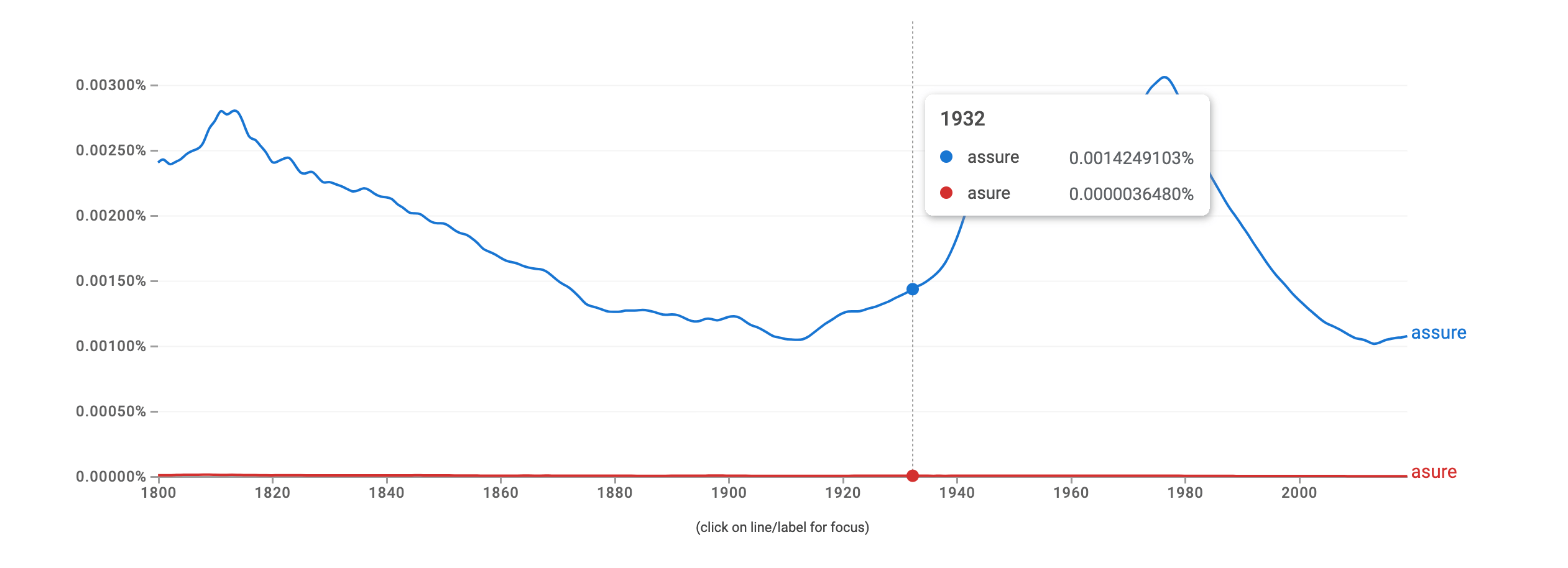- "Asure" is the incorrect spelling of "assure."
- To "assure" means to guarantee or give confidence to someone by providing a promise or certainty regarding a particular outcome, action, or state of affairs, thereby alleviating doubts or concerns. It involves offering reassurance and ensuring a sense of security.
✅ I wanted to assure my friend that the project was progressing smoothly, so I provided regular updates and addressed any concerns to ensure their confidence in our collective efforts.
In the provided sentence, "assure" means to provide confidence, reassurance, or a guarantee. The speaker aims to eliminate doubts and instill confidence in their friend by offering regular updates and addressing concerns, ensuring a sense of trust and certainty in the progress of the project.
Assure
"Assure" is a versatile verb with several related meanings, all centered around the idea of providing confidence, certainty, or security. Here's a breakdown of its various uses:
1. To Make Certain or Convince:
- Directly stating something with confidence: "The doctor assured me everything would be alright."
- Persuading someone to believe something: "Her calm words assured them of the team's success."
- Making oneself sure of something: "He needed to assure himself that the door was locked."
2. To Guarantee or Promise:
- Formally pledging something will happen: "The contract assures us a steady income."
- Offering a firm guarantee: "The warranty assures the product's quality for five years."
- Providing emotional security: "She assured him of her love and support."
3. To Make Safe or Stable:
- Protecting from danger or risk: "The security system assures the safety of the building."
- Establishing a firm foundation: "Strong policies helped assure the company's future."
- Creating a sense of calmness and relaxation: "The peaceful music assured her a good night's sleep."
4. To Give Confidence or Encourage:
- Boosting someone's spirits or self-belief: "His reassuring smile calmed her nerves."
- Motivating someone to act with confidence: "The coach's words assured the players they could win."
- Easing someone's anxiety or fears: "She assured him there was nothing to worry about."
Additional Notes:
- "Assure" is often followed by the preposition "of" or a phrase introducing the subject matter.
- It can be used in both formal and informal contexts.
- The noun form is "assurance," which refers to the state of being certain or having a guarantee.

Examining the graph below, we can see that the word "assure" has occurred more frequently than "asure."

How do we pronounce assure?
In American English, "assure" is pronounced uh·shur.
In British English, "assure" is pronounced uh·shuor.
These are just the standard pronunciations, and there may be slight variations depending on regional accents and individual speech patterns.
🖊️ Embrace Meaning and Examples
🖊️ Uncomfort or Uncomfortable: Which Is Correct?
Why does the misspelling of assure as asure occur?
1. Typographical errors: This is the most common reason. Typing mistakes and autocorrect misinterpretations can easily lead to "asure" instead of "assure." These happen especially when typing quickly or without carefully proofreading.
2. Phonetic influence: In some accents, the pronunciation of "assure" can sound similar to "asure," especially if certain vowel sounds are slightly slurred or shortened. This can lead to confusion when spelling the word from memory.
3. Lack of familiarity: If someone is not familiar with the correct spelling of "assure," they might be more likely to misspell it as "asure," especially if they rely on phonetic spelling or visual memory.
Other common misspellings of assure
- ashure
- assurr
- assuree
Example sentences for the misuse of the word assure as asure
- The correct spelling is "assure," not "asure."
- Please note that "asure" is a misspelling; the accurate term is "assure."
- In professional writing, it's important to avoid misspelling common words, such as using "asure" instead of "assure."
- If you want to convey certainty or confidence, remember to use the proper spelling— "assure," not "asure."
- Common errors include substituting "asure" for "assure"; make sure to proofread and correct such misspellings in your writing.
Example sentences of assure
- To ease her worries, he tried to assure her that everything would be fine.
- The manager sought to assure the team that their hard work was appreciated and recognized.
- The warranty is designed to assure customers that the product is free from defects.
- The leader took steps to assure the public that the organization was committed to transparency and accountability.
- Please allow me to assure you that your concerns will be addressed promptly.
Synonyms of assure
- Guarantee
- Promise
- Reassure
- Confirm
- Certify
- Ensure
- Affirm
- Secure
- Convince
- Pledge

Want to sound like a native speaker?
Engram’s AI-powered grammar checker makes your English sound like a native speaker’s, suggesting natural English expressions on top of fixing grammar, spelling, punctuation, word order, and vocabulary.

References:














